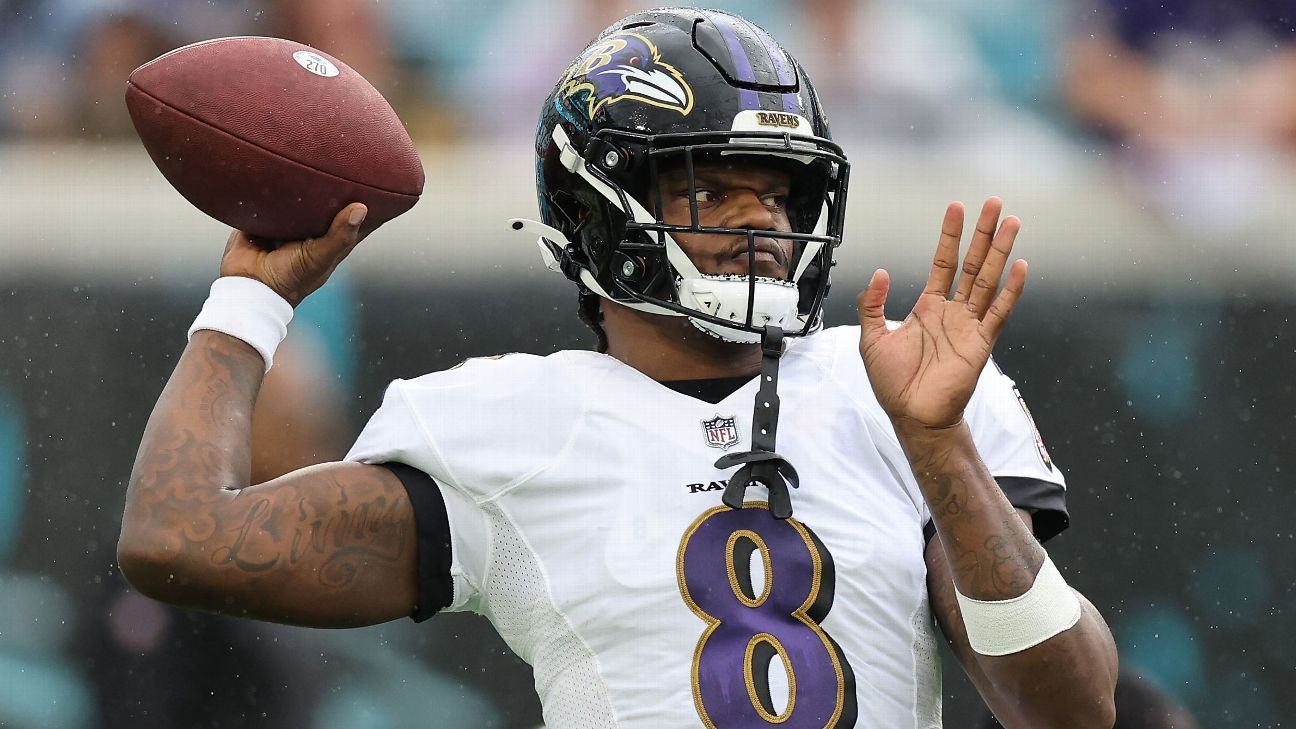At the NFL combine Wednesday, Eric DeCosta was asked whether he has to consider trading quarterback Lamar Jackson at some point and responded that few teams have made more trades since he became the Baltimore Ravens‘ general manager four years ago.
“That being said, I covet great players. I covet quarterbacks. And I love Lamar,” DeCosta told Baltimore-area reporters in Indianapolis. “So, that has not factored in one time with me. We want to do what’s best for the club. We try to do what we can for Lamar. We want to make everybody happy.”
DeCosta expressed hope that a deal can be reached with Jackson before next week’s franchise tag deadline despite no agreement so far after two years of negotiations. DeCosta said he met with Jackson recently, adding, “Both understand the urgency of the situation.”
If the sides can’t reach a new contract by Tuesday, Baltimore would have to put the franchise tag on Jackson to keep him from becoming an unrestricted free agent. The tag would take up all of the Ravens’ available salary cap space and severely limit what the team can do in free agency, which potentially includes adding a much-needed wide receiver and a starting cornerback.
“You can’t win in this league without a strong quarterback. I mean, that’s been proven,” DeCosta said. “So, we want Lamar here. We think he’s one of the best quarterbacks in the league. He’s certainly one of our best players, and we want him back. We understand that living in a world without a quarterback is a bad world to live in.”
According to sources, Jackson wants a fully guaranteed deal like the one given to Deshaun Watson last year, and the Ravens have been reluctant to offer that because they believe Watson’s deal is more of an outlier than a precedent. DeCosta called it a “tough negotiation” with Jackson, who is one of the few high-profile players who represents himself rather than employing an agent.
“I don’t want to live in a world where there’s no optimism, where I’m just going to give up hope,” DeCosta said. “You guys have seen me during games. Sometimes I’m in a dark place at the end of the game because there’s no hope. We’ve lost the game. I don’t see that here. I won’t feel that here. I refuse that. I’ve seen a lot of deals happen when things look bleak, or I haven’t seen deals when I would’ve thought it was a slam dunk. It takes two people to do it. I remain positive. I have no reason not to remain positive.”
Ravens coach John Harbaugh said that he is “fervently hopeful” a deal will get done and that he believes “200 percent” that Jackson wants to be with the Ravens. Throughout this offseason, Harbaugh has planned for Lamar being part of this team going forward. Harbaugh said that, when talking to offensive coordinator candidates, “All those interviews were based on Lamar being the quarterback.”
“He’s my quarterback, he’s my guy,” Harbaugh said. “I love him.”
If the Ravens have to use the tag on Jackson, DeCosta would not say whether the team would use the non-exclusive ($32 million) or exclusive one ($45 million).
“Sure, they’re big numbers,” DeCosta said. “We’ve known they’re big numbers, [and] we’re prepared for that. And we’ve got four or five or six different plans based on what happens.”
Under the non-exclusive tag, Jackson could sign an offer sheet with another team but Baltimore has the right to match it or take two first-round picks as compensation. Under the exclusive tag, the Ravens control Jackson’s rights as well as any trade talks and compensation with other teams.
The Ravens, who currently have $21 million in cap space, would have to create more room to fit Jackson’s tag under the cap.
DeCosta acknowledged that Jackson’s unresolved contract situation is a “wrench” in the team’s plans going forward, especially when it comes to extending contracts for other players.
“It does create a little bit of a haze as to what the future is going to look like with your roster,” DeCosta said. “There are some things that we’re not going to do right now that maybe we would try to do. But there’s no bigger question right now, no bigger decision, [and] there’s no bigger challenge for this organization moving forward than this contract.”
